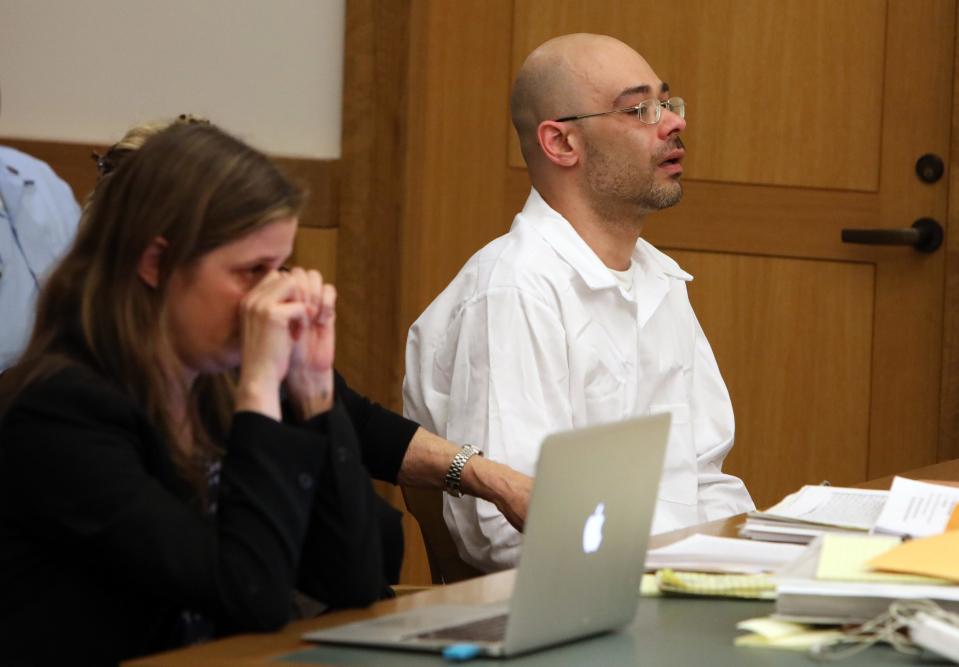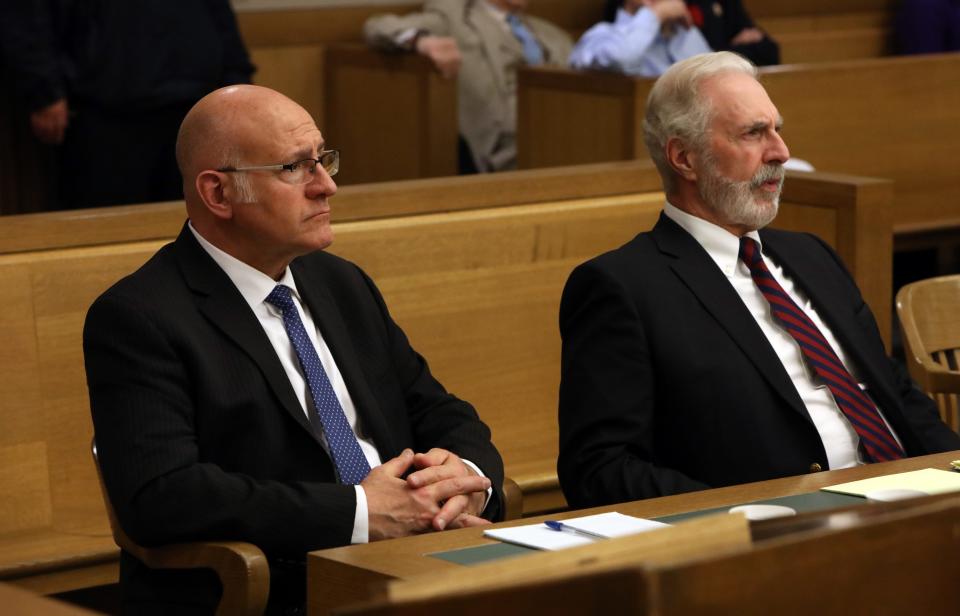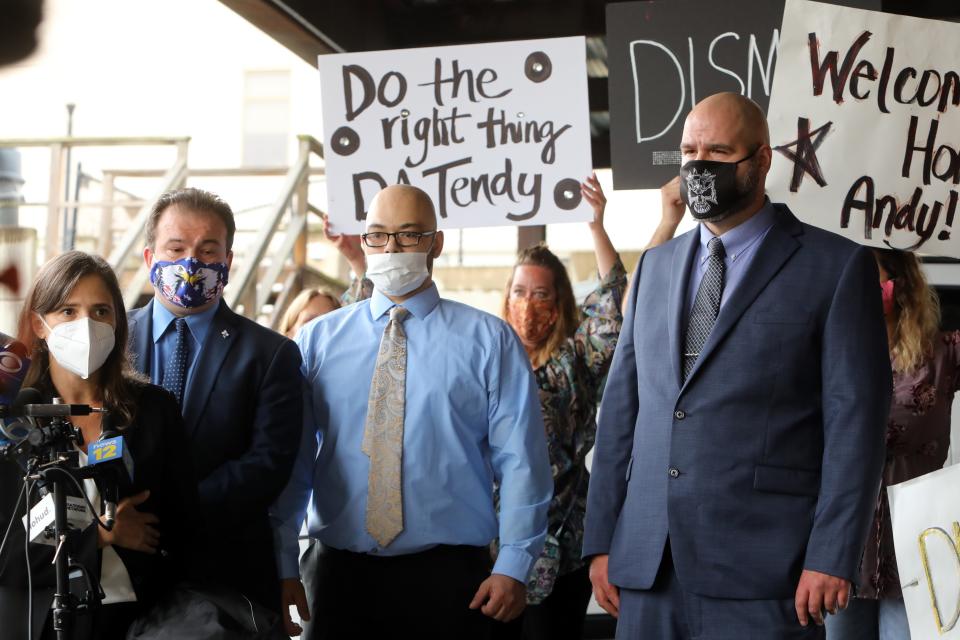Murder retrial in 1994 killing of 12-year-old girl set to begin in Putnam
The chilling six-page account of the rape and death of 12-year-old Josette Wright was written out by a Putnam County Sheriff’s Department investigator and signed by Andrew Krivak, an apparent confession that was a key factor when jurors convicted him of murder in 1997.
But when Krivak goes back on trial this month, his lawyers Oscar Michelen and Karen Newirth will mount a full scale assault on the statement – they resist even referring to it as a confession – and are confident that the rest of the prosecution’s case has withered in the ensuing years. They cite evidence pointing to someone else as the killer and significant credibility issues dogging the main witness and investigators in the case.
Jury selection began Monday in the county courthouse in Carmel, with 20 percent of the jury panel telling Judge Robert Prisco they were familiar with the case. Opening statements are expected next week and the trial could last up to six weeks.
The defense got a boost Friday when Judge Robert Prisco said he would allow them to call an expert on false confessions. They contend jurors need someone to explain the phenomenon – because average people cannot wrap their heads around someone saying they committed a horrific crime when they did not.

Released: Krivak leaves Putnam County jail, free of custody for first time in 24 years
Extortion:Witness who helped free men in Putnam murder case pleads guilty to extortion
Wright’s killing was among the county’s most heinous. She disappeared in early October 1994 and her skeletal remains were found nearly 13 months later in woods off Fields Lane in Patterson. She had been hogtied and asphyxiated, apparently with her underwear that was found with the body.
Krivak and his friend Anthony DiPippo were not arrested until July 1996, when they were age 18 and 19, respectively, and they were convicted at separate trials the following year.
Krivak had spent 24 years of a 25-to-life sentence when he was freed on bail in October 2020. That was a year after his conviction was overturned based on the same evidence that won DiPippo an acquittal in 2016. That third trial of DiPippo’s was the first time he was able to make the case that a Connecticut sex offender, Howard Gombert, was likely Wright’s killer – including the testimony that Gombert told a fellow inmate he had raped Wright and that two “suckers” were in prison for what he had done.
Why is Krivak being retried?
Although Krivak’s conviction was overturned, prosecutors rejected any call to dismiss the indictment. Putnam District Attorney Robert Tendy has steadfastly maintained that the original juries got it right. He blasted county politicians for approving a $12 million wrongful conviction payout for DiPippo. And while most elected district attorneys leave the nuts and bolts of trying cases to their prosecutors, Tendy will join First Assistant District Attorney Larry Glasser at the prosecution table as they try to win a new conviction and return Krivak to prison.
Mark Baker, a lawyer who won DiPippo’s second appeal and helped get him acquitted, remains shocked that they are retrying Krivak, saying the case cries reasonable doubt because it’s “so full of holes, it’s Swiss cheese.”
“It’s an obsession. They never got over the loss in Anthony’s case,” Baker said. “The DA is putting himself in the lion’s den. It’s like Captain Ahab going after the white whale.”
Tendy declined to comment leading up to the retrial. He has expressed confidence in the prosecution's case in recent years and said his office would not have gone forward if they did not believe in Krivak's guilt. He brushed aside Baker's assessment Friday, pointing out there was nothing unusual about his direct involvement, as he has tried three other cases – including a murder case – since becoming DA seven years ago. He spent most of his career as a trial lawyer, first in the Manhattan District Attorney’s Office and later as a defense attorney.

Krivak, now 45, has bail conditions requiring him to remain at home under electronic monitoring except for court appearances and medical appointments. He said it wasn’t until recent pre-trial hearings, all-day affairs during which he couldn’t be home, that he was allowed to eat out at restaurants with his lawyers.
He expresses frustration about the time it has taken since his release but is confident and anxious to have a jury clear his name.
"It's bittersweet. You appreciate the fact that you're finally making progress towards vindication," he told The Journal News/lohud. "At the same time, I don't have my liberties. It's a release but it's not a freedom."
His lawyers would not allow him to discuss specifics of the case, particularly regarding the statement as he will likely be testifying about that for the first time.
He said that he too can't understand how the prosecution has gone forward, especially considering DiPippo's acquittal. But while in 1997 his mood awaiting trial was "the day to day emotion of hoping the truth of your innocence does come out" now he knows that most of it has come out already.
Susan Wright, Josette's mother, declined to comment last week. She will be at the trial, as she has been at all of them. She has said in the past that she is a piece of Josette there in the courtroom, and has bemoaned that the focus on DiPippo and Krivak has allowed little attention to be paid to who Josette was and how she suffered.
Krivak's statement to Putnam Sheriff's Investigators Patrick Castaldo and William Quick, after he was administered a lie detector test by another investigator, Daniel Stephens, is what differentiated his case from DiPippo's. While his friend twice had convictions overturned, Krivak never got a second chance until now.

DiPippo's acquittal came after he was finally able to present evidence related to Gombert. His lawyers called victims of Gombert who described how he would tie them up when raping them and gag them with their underwear. And the jury heard from Joseph Santoro, the Connecticut inmate who detailed his prison conversation with Gombert.
Santoro also gave his account at the hearing that led to Krivak's conviction being thrown out.
Who will testify?
Gombert's victims will again testify for Krivak, as will Santoro. But he will come to the trial with more baggage than he had previously.
Last year, he threatened to recant his testimony if he wasn’t paid more than $1 million. Krivak’s lawyers went to the FBI and Santoro was arrested. He pleaded guilty to extortion and was sentenced to four years in federal prison. The sentence is running at the same time as a state prison term for menacing a police officer.
Although he insisted when he pleaded guilty that his original testimony about Gombert was truthful, prosecutors will use the extortion effort to undercut his credibility about the prison conversation.
A key prosecution witness will once again be Denise Rose, an ex-girlfriend of DiPippo’s who has testified at all four trials that she was in Krivak’s brown van on the night of Oct. 3, 1994, and watched as first Krivak and then DiPippo raped a tied-up Josette before they carried her lifeless body out of the van and into the woods.
The statement she gave detailing that wasn’t given to the investigators until April 1996, after she first denied any involvement. The defense has long maintained that she didn't witness any rape or killing but was fed details by investigators and adopted their account after she was threatened with prosecution in the killing and an unrelated criminal case she was facing.
The defense believes it has discredited Rose's testimony, from the description of how Josette’s hands were tied, to how much moonlight there was at that time of year, to evidence that the brown van was on blocks in Krivak’s driveway and not operational at the time.
Rose has stood by her account but has acknowledged being fed details by Castaldo. And she acknowledged lying at her deposition in DiPippo’s civil lawsuit four years ago when she brought up for the first time that he had brandished a gun during the rape.
Susan Wright reported her daughter missing on Oct. 4, 1994, but the passage of time before Josette's body was found made it impossible to pinpoint the day she died. The defense in all the trials has taken aim at Rose's reference to Oct. 3 as the night of the killing because two witnesses – one Josette's friend, the other her former teacher – claim they saw her days after that. Both are expected to testify not only about seeing Josette then but about the coercive efforts of Castaldo to convince them they were wrong.
The judge mostly ruled against the defense in pre-trial motions. He also denied their bid to call a linguistics expert to opine about the language in the statement and whether it was taken verbatim from Krivak as Castaldo and Quick have long maintained.
The question of a 'false confession'
But Prisco he is allowing the false confession expert, Kyle Scherr, albeit with some limitations on the extent of his testimony.
Scherr cited nine factors in false confessions that appeared to be present in Krivak's case. Among those that he will be allowed to testify about are contamination and minimization.
One focus of the defense is that the statements of both Rose and Krivak were contaminated by investigators because they included that Josette's hands had been tied in front of her. That was what Castaldo mistakenly believed at the time before forensic testing showed Josette had been hogtied, her hands behind her.
Krivak did not testify at his first trial and there is no public accounting for what his lawyers contend was the coercion that preceded him signing the statement.
The account given by investigators of their July 1, 1996, interrogation was that after Krivak continuously denied any involvement he asked to take a polygraph. When told the results showed he had lied in his denials, he questioned whether rape was less than murder, they contend, and proceeded to admit to raping Josette but not killing her.
But jurors this time will learn that seven years before Krivak's statement, Stephens induced a false confession from a Peekskill teenager, Jeffrey Deskovic, suspected in the rape and murder of a classmate. Deskovic spent 16 years in prison before DNA matched the real killer in 2006 and eventually won a multi-million dollar federal jury award against Putnam County for Stephens' actions.
Deskovic, now a lawyer who works to free the wrongfully convicted, will be in court supporting Krivak during the trial.
This article originally appeared on Rockland/Westchester Journal News: Andrew Krivak on trial again in murder of Josette Wright in Putnam

